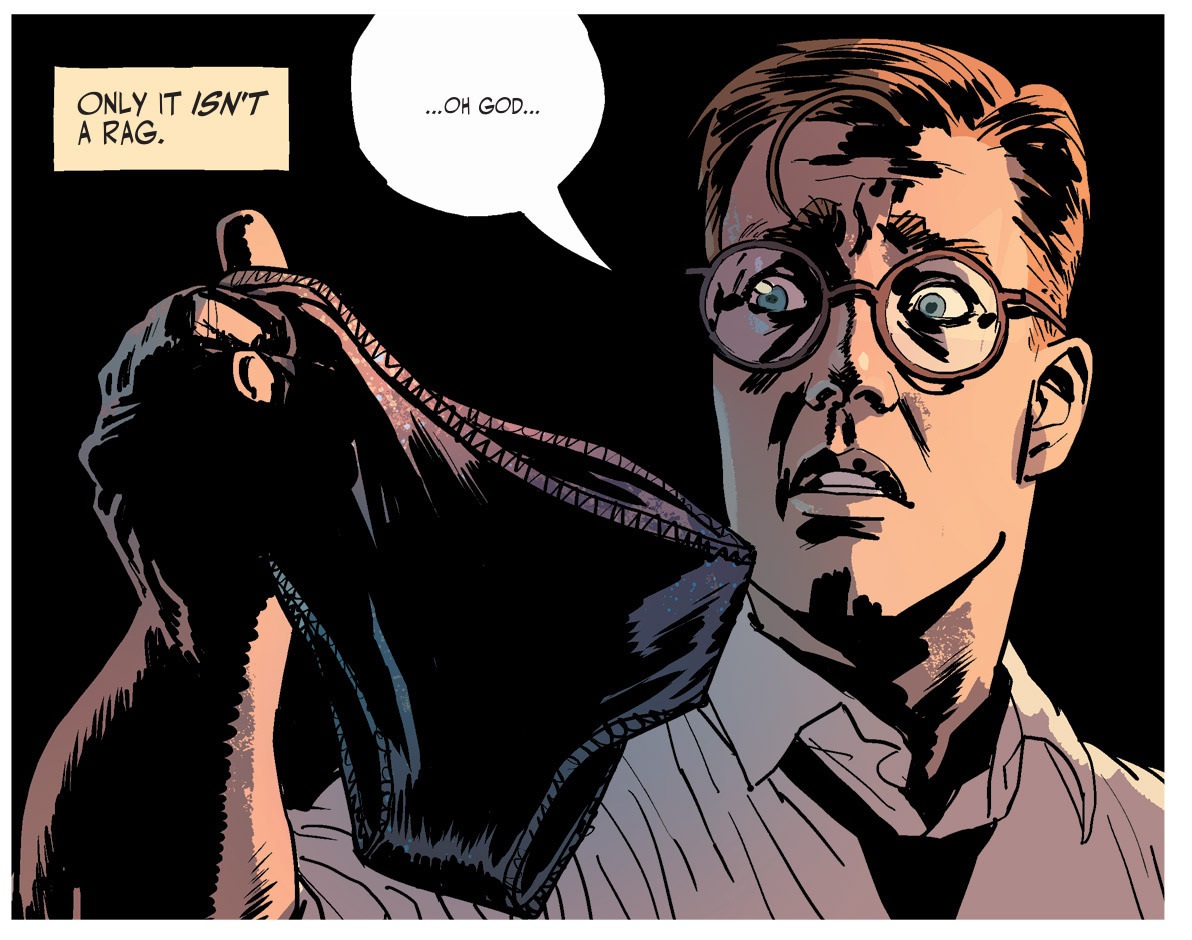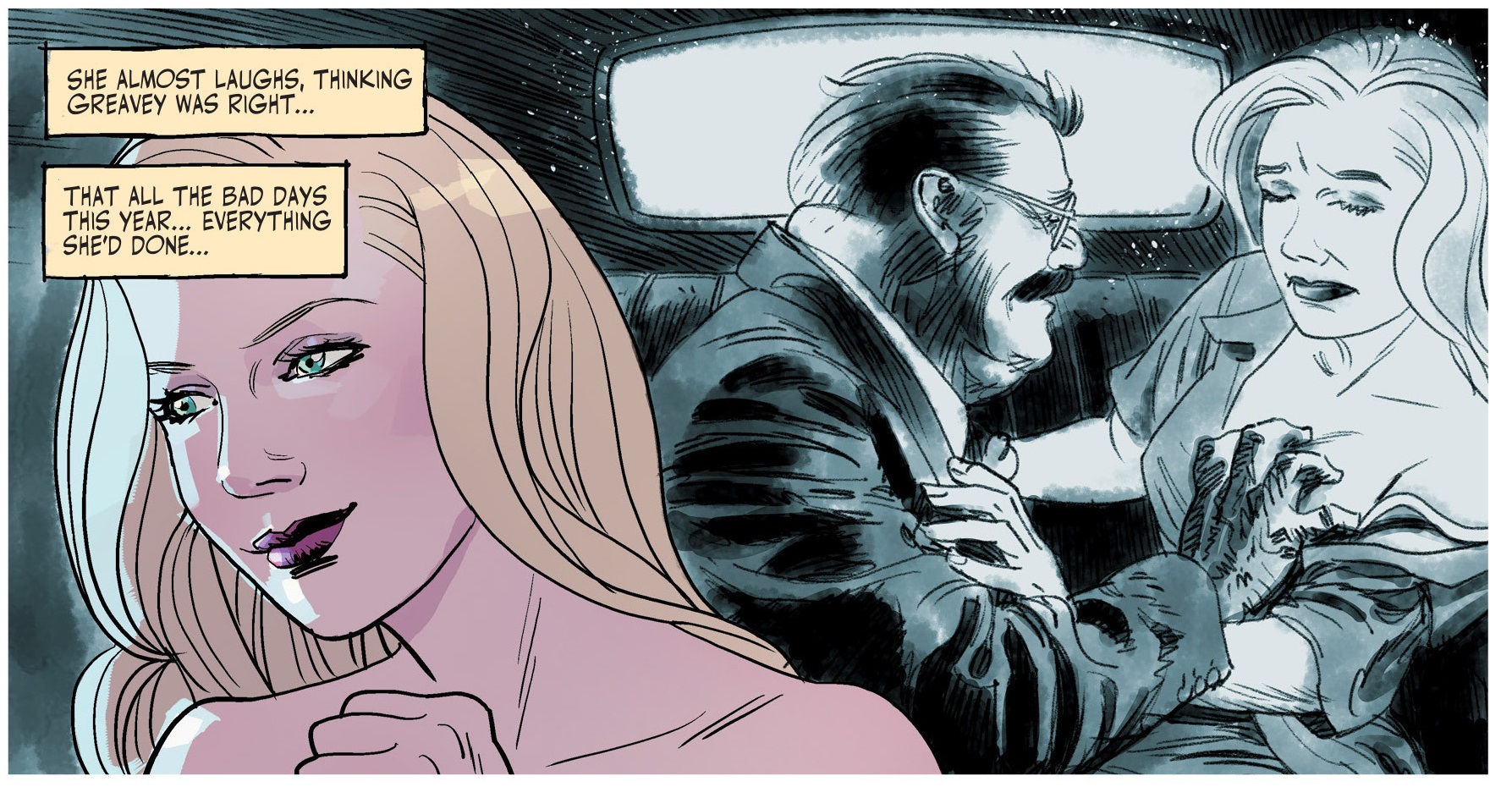A Review of The Fade Out by Ed Brubaker, Sean Phillips, and Elizabeth Breitweiser.
_____________
Synopsis: 1948 Hollywood. Charlie Parish wakes up from a drunken stupor to find a dead starlet in the room next door. He covers things up and later finds out that the studio is making things go away with a story about a suicide. Parish has writer’s block but he’s aided by his blacklisted writer-mentor, Gil Mason—a loose cannon who will soon turns things upside down for him. At the edge of Parish’s vision is a Hollywood fixer-producer in the vein of Eddie Mannix. A new star is cast and it seems like the couch really sucked way back then. Movie execs—they suck (and seem to have a thing for kids)! Actors—they like sex and porn! Orgies, sex communes, violence, the red carpet, bar fights, homosexuals in car accidents (seems like a Van Johnson reference)…etc.
_____________
Some people told me to read this. And I’ve seen it recommended to semi-retired comic readers returning to the fold; just like you would, say, hand a copy of Maus to your friend the sniffy English Literature/Media Studies professor (but not Watchmen presumably).
It’s as if these friendly comics evangelists hadn’t read a single noir novel, watched Chinatown (or Farewell, My Lovely, or Sunset Boulevard or whatever) even once, or been apprised of the assorted falsehoods of Kenneth Anger’s Hollywood Babylon. Because you don’t need to be an aficionado to realize that almost everything on display here is as old as the Hollywood hills—the drunken pool side orgies, the black list, the abused ingenue, the darkened rooms where the wretched eke out their meager lives on typewriters, hard liquor, and shadows from louvered blinds. It’s as if someone went to some Hollywood noir buffet, stuffed himself silly and then purged himself in both directions with the vigor of a water cannon.
And, hey, didn’t I see this one on Ray Donovan just the other day? I mean the whole waking up beside/near/on top of a dead woman thing. He like sorted it out in about 10 minutes after smacking some people around, which is about the maximum amount of the time I can tolerate this nonsense. Dead women and tortured writers—they go together like horses and carriages in Hollywood apparently; like pineapples and Mai Tais—the men being the hard rum and the women the delicately sliced garnishings. What we need is more broody depressed women waking up beside dead men for a change (kidding).
So a tiresome retread then.
If not for Sean Phillips photo-referenced studiousness, this would be almost unreadable. It is Phillips’ art which carries the comic’s sense of time and space. Every other character seems to be scraping by on the barest of plots (sexual deviance, pedophilia, your common or garden listlessness) and headlines cribbed from crumbling newsprint—Wars! Scandal! Commies! The smattering of period history smothers any sense of suspense or urgency. This isn’t the “real” world; it’s lousy, meaningless research (and I’m not talking about the photo reference which is fine).
On the other hand, did women’s panties really look like men’s briefs back in the late 40s?
Now there’s a trick when you’re too lazy to do the work—it’s called just making things up. Frank Miller had a firm grasp of this principle in The Hard Goodbye (the first Sin City story). There’s a dead woman in a heart-shaped bed in this one as well but Miller isn’t interested in ladling on the “reality.” The only thing that concerns Miller in Sin City are his sexual fetishes—his deep conviction that every woman really wants to be a stripper and/or a whore, and every man a pimp and a bouncer. The first Sin City, at least, is essentially one long act of masturbation, and the characters and situations fully coherent within that setting. The Fade Out wants the regurgitateded noir tropes with the historical reality and succeeds at neither. The women don’t fare much better either, mostly fucking and sucking to get by; occasionally beaten up and then dying.
Otherwise, housewives (okay, there’s a lady publicity agent in there as well but maybe she’s the murderer). It’s all in the Hollywood scandal playsheet. I always knew that Father Knows Best gave us the whole truth about American life.
Now I have nothing against homage and there’s quite a bit of that going on in The Fade Out. It’s cute when you have Otto Preminger turn up as the exemplar German film noir director or when you see a skewed version of Gun Crazy filmed later in the series. But what I do find utterly tedious is the rehashed war traumatized, guilt-ridden, would be writer-detective stumbling his way through a Hollywood conspiracy thingamabob. And of course he falls in love and gets to have great sex with the Veronica Lake lookalike. I mean, why wouldn’t he? It’s called motivation. The sex, as always, is a call to action, and there’s also an important plot point which turns on the fact that she has been told to shave her pubic hair. This only happens in the real world.
I think we’ve just about sucked the marrow dry when it comes to stories Hollywood tells about itself. And yet a surfeit of vanity and forgetfulness means that we will never see the end of these projects. With cinema now the new religion, it seems only natural that comics should pay deference to this modern Moloch. You should be careful that he doesn’t eat your brains though.


